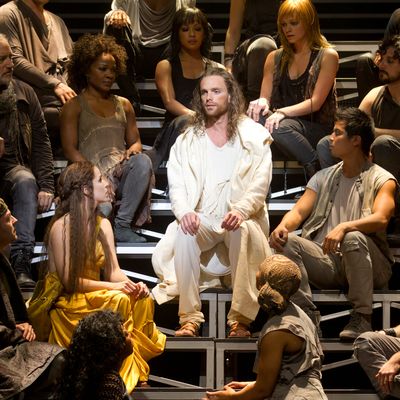
Lepers! They just can’t get themselves organized. “Form a line!” I half-expected Jesus (Paul Nolan) to scream when, halfway through the first act of Jesus Christ Superstar, he’s buried in caterwauling Terry Gilliam extras. Now in its fourth incarnation on Broadway (its second since 1999), Jesus Christ Superstar has always existed just a wink and a prayer away from sheer comedy. In 1971, it was provocative, post-flower-child rock revisionism from young newcomers Andrew Lloyd Webber and Tim Rice, and its notion of Christ as a troubled, tetchy creature of fame—instead of a weightless agent of grace—was edgy and irreverent, especially by Broadway standards. Now, at a safe distance, it’s easier to see Superstar for what it is: A powerfully silly show that still packs enough of a musical wallop to ensorcel cynics and believers alike … for up to three minutes at a time. (Any longer, and we risk actually considering some of Rice’s deftly done, definitely dumb lyrics: “Buddha, was he where it’s at? / Is he where you are? / Could Muhammad move a mountain or was that just PR?” Adorkable.)
But results vary with the relative elan of each production, and Des McAnuff’s brisk, dour, dimly lit interpretation (imported with much fanfare from the Stratford Shakespeare Festival) is a kind of apostasy: We’re presented with a Power Christ who doesn’t play to the arena at all. Maybe that’s because he’s tired of the spotlight; maybe it’s because he’s tired of being dance-mobbed by the cast of Waterworld. This Superstar’s constant browfurrowing is so cosmically at odds with the intrinsic goofiness of its design and execution—fake beards, leather dusters, and the kind of lazy postapocalypticism that combines the worst of Blade Runner with the bargain rack at Ricky’s—I often wondered whether someone was pulling my leg. But one glance at Griefer Jesus told me, definitively: “We are not amused (and by ‘we’ I mean the Trinity).”
That’s not to say Nolan makes a lousy Christ—just a bemusingly grim one, in no mood to pander or even pull much focus. (He’s aided in this by McAnuff’s show-choir blocking, which mostly consists of power-walking and stairclimbing. Those Judeans must’ve been buff.) But Nolan is in great, glittery voice, and finds a near match in Judas (Jeremy Kushnier, subbing for the ailing Josh Young until further notice), his “right-hand man” turned betrayer. What exactly is being debated, in punishing falshreddo, on this onyx-black stage, with its streaming news tickers and sinister industrial catwalks? Is it realpolitik vs. idealism? Rank demagoguery vs. real change? Don’t think too hard: Superstar is interested in nothing much deeper than the creation of an icon, and the raw optics and acoustics that go into it. McAnuff interprets this as a mandate for top volume and top speed, and the first act flies by in a blast of dance-fighting, ointment, and judicious camp-stool placement. (The literal-minded staging invites us to focus on such details: Jesus’ ever-present stool is functionally an honorary member of the cast.) Chilina Kennedy, as Mary Magdalene, sings a lovely “Everything’s Alright” and a lovelier “I Don’t Know How to Love Him”—two of the most sinuously infectious melodies in modern musical theater—but despite the sweetness and strength in her voice, her songs slip away into the ether. We really don’t know how to love her, perhaps because she’s being rushed through her numbers, with little attitude towards what she’s doing. God knows I appreciate a little minimalism in a Broadway performance, but a totally poker-faced Mary-Mags is really pushing it.
Meanwhile, Bruce Dow shoots for the maximum bandwidth allowable, briefly stealing the show (as he’s intended to) as King Herod, whom he transforms into a gelatinous mass of self-loathing. I suspect Dow is pulling off the tonal hairpin-turn that McAnuff, chief architect of The Who’s Tommy, hopes the whole production can negotiate: going from high camp to baleful, Occupy the Second Temple fury in one pivot. But it’s just not that easy to turn this battleship around, even if you get it up to ramming speed. McAnuff’s second act is far more fierce and dug-in than his first, and when he finally succumbs to the pure spectacle of the crucifixion (and its accompanying production number, the sublimely ridiculous “Superstar”), the show briefly explodes: It’s suddenly the arena concert of sheer rock nonsense that it’s naturally intended to be. There are just too few moments like these, unfortunately, and this Superstar, while forceful and far from incompetent, is consistently less than you’d expect from a second coming, or even a fourth.
Jesus Christ Superstar is at the Neil Simon Theatre.

